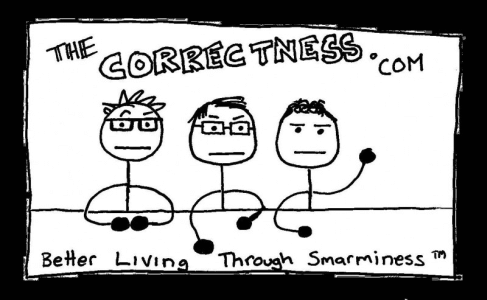12 Days of Chipmunks: “Over the River and Through the Woods”/”All I Want For Christmas (Is My Two Front Teeth)”
DECEMBER FOURTEENTH: DESTRUCTION
When last we saw the Chipmunks, they had been brainwashed into behaving like normal, human children by their adoptive father, Dave Seville. The indoctrination continues in “Over the River and Through the Woods”, wherein Dave introduces the concept of grandparents to a species whose lifespan rarely exceeds 3 years.
http://www.youtube.com/watch?v=GAO2tI5DAOA
The song begins with Dave and the Chipmunks going “over the river and through the woods to Grandfather’s house”. Why Dave’s father lives in a house only accessible by horse-drawn sleigh over a river and through a forest is unclear, considering Dave’s urban—or at least suburban—lifestyle. Note the subtle dig at James Pierpont (“the horse knows the way to carry the sleigh”). The next few lines detail the icy harshness of winter (“it stings the toes and bites the nose”), something that the Chipmunks, a hibernatory species, wouldn’t normally have to deal with. Of course, Dave is completely oblivious to any adverse affects his little experiments might be experiencing. He’s too busy congratulating himself on being able to force animals to act like people to notice his mistake. For now.
Now we come to Dave’s verse. “Over the river and through the woods, to have a first rate play,” is as far as he gets before Alvin pipes in, effectively taking over. Dave complains that he’s “supposed to sing [the verse]”, but what is his reasoning? Does it have to be sung by Dave, or can anyone sing it, as long as they are a Seville? (Note that “Seville” is a homonym of “civil”.) Heretofore, all the songs had been divided into two singing parts: human (Dave) and chipmunk (Alvin, Simon, Theodore). But that barrier no longer exists, and it appears Dave has only realized that fact now. His situation only gets worse as the Chipmunks begin to sing again: “we seem to go extremely slow, it is so hard to wait!” The parallels to “The Chipmunk Song” are hauntingly clear. Dave may have succeeded in getting the Chipmunks to act like people, but he hasn’t succeeded in getting them to act like him. Moulding the Chipmunks in his own image hasn’t made them similar to their “father” any more than Dave the city slicker is similar to his father, the country bumpkin. The Chipmunks are still greedy, impatient wolves—but now they’re greedy, impatient wolves in Seville clothing.
Dave does not speak for the rest of the song. Most likely he is reflecting on the gravitas of his horrible mistake, and silently wishing the Chipmunks would listen to him. Little does he know, his wish is about to come true!
In the worst way possible.
DESTRUCTION, PART II
http://www.youtube.com/watch?v=nOqbOLycwYs
“All I Want For Christmas (Is My Two Front Teeth)” is a curious Christmas song, made more curious by the fact that a rodent is singing it. Rodents don’t lose baby incisors like human children do; their incisors continually grow throughout their life. In fact, if a rodent doesn’t constantly gnaw on objects, its teeth will just grow and grow, longer and longer, until they pierce straight through its lower jaw. It seems quite strange, then, that Theodore would be lamenting the loss of his two front teeth, considering the sheer unlikelihood of them having fallen out.
Therefore, he must have pulled them out. Unlike Alvin and Simon, Theodore seems to genuinely want to please Dave. He knows Dave wants him to be human; if that means ripping out his rodent teeth, so be it. Theodore doesn’t seem to have self-esteem of his own; as youngest and lowest in status of the Chipmunks, his only will is to serve others. His own happiness isn’t even part of the equation. As long as someone else is happy because of him, he has a reason to continue living. And currently, that someone is Dave Seville. I’ll admit, “All I Want For Christmas (Is My Two Front Teeth)” is a pretty cute song when sung by a gap-toothed little tyke. Presumably, that’s what Theodore was thinking as well. But remember, rodent teeth aren’t meant to be pulled out. And Theodore is not an experienced dental worker. The song takes on a frightening, desperate tone when one imagines Theodore smiling through the pain, singing the song as best as he can, with blood running from his shattered mouth like a faucet.
Ironically, one of Dave’s first lines in the song (presumably before Theodore has turned around to reveal his mangled face) is “Didn’t you get what you wanted?”
